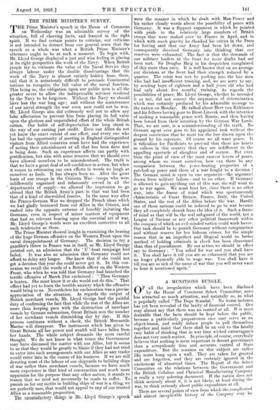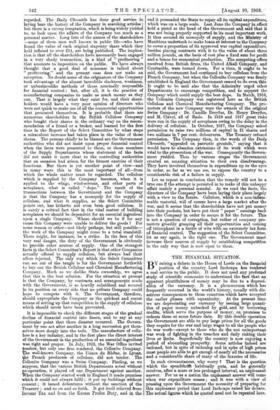A MUNITIONS BUNGLE.
OF all the irregularities which have been disclosed by the House of Commons Select Committee, none has attracted so much attention, and naturally so, as what is popularly called "The Dope Scandal." No worse instance has yet been revealed of the laxity of financial control. One may almost say that there was no control at all. It is most desirable that the facts should be kept before the public, because a particularly preposterous case may serve as an object-lesson, and really induce people to pull themselves together and insist that there shall be an end to the fatally easy habit of thinking that in war time wicked extravagance does not very much matter. In principle, of course, everybody believes that nothing is more important in decent government than a scrupulously firm and accurate control of State expenditure. But the maxims on this subject are rather like texts hung upon a wall. They are taken for granted and are forgotten, and they are certainly ignored in the excitement of abnormal times. The Report of the Select Committee on the relations between the Government and the British Cellulose and Chemical Manufacturing Company is really a very sobering document. If the nation does not think seriously about it, it is not likely, at least during the war, to think seriously about public expenditure at all. There are several points of view from which the complicated and almost inexplicable history of the Company may be regarded. The Daily Chronicle has done good service- in laying bare the history of the Company in searching articles ; but there is a strong temptation, which is being widely yielded to, to look upon the affairs of the Company too much as a personal matter. Long lists of the names of the shareholders —some of them men well known in public life—who have found the value of each original sixpenny share which they held inflated to over £.14, are being published. The implica- tion is that all the shareholders have necessarily been engaged in a very shady transaction, in a kind of " profiteering " that amounts to imposition on the public,. We have always thought that a good deal of nonsense is talked about "profiteering," and the present case does not make an exception. No doubt some of the originators of the Company took advantage of the almost incredible slackness, weakness, or unbusinesslike methods of those nominally responsible for financial control ; but, after all, it is the practice of manufacturing companies to make as much money as they can. That is largely what they exist for, and their share- holders would have a very poor opinion of directors who were not quick to make use of all the commercial opportimities that presented themselves. It is probable that there are • numerous shareholders in the British Cellulose Company who bought their shares in the ordinary way on the reoom- mendation of a friend or a broker, and learned for the first time in the Report of the Select Committee by what steps a miraculous inorease had taken place in the value of those shares. The persons chiefly to be blamed are the Government authorities who did not insist upon proper financial control when the facts were presented to them, or those members of the Supply Departments whose statement of the facts • did not make it more clear to the controlling authorities that an occasion had arisen for the firmest exercise of their functions. But there is yet another point of view—and in many ways this is the most important of all—from which the whole matter must be regarded. The cellulose which is supplied by the Company becomes, when it is applied to the wings, wind-screens, and other parts of aeroplanes, what is called "dope." The result of the transactions between the Government and the Company is that the Company has a monopoly for the supply Of cellulose, and what it supplies, as the Select Committee points out, has hitherto not even been good cellulose. It is surely a critical fact that in the vital matter of building aeroplanes we should be dependent for an essential ingredient upon a single Company. Where should we he if for any cause this Company were unable to deliver the goods I. For some reason or other—not likely perhaps, but still possible— the work of the Company might come to a total standstill. There might, for instance, be a strike. In the face of this very real danger, the duty of the Government is obviously to provide other sources of supply. One of the strangest facts in the Select Committee's Report is that other Companies actually offered to supply cellulose, but always had their offers rejected. The only way which the Select Committee can see out of the tangle is for the Government forthwith to buy out the British Cellulose and Chemical Manufacturing Company. Much as we dislike State ownership, we agree that this is the best solution. For the situation at present is that the Company, by contracts and arrangements made with the Government, is so heavily subsidized and secured In its position on every side that no prfi,ate Company could hope to compete with it. The Governraent, therefore, should expropriate the Company as the quickest and surest means of setting up that competition in the supply of cellulose which should never have been prevented.
It is impossible to check the different stages of the gradual decline of financial control into fiasco, and to say at any particular point that there disaster occurred. The Govern- ment by one act after another in a long succession got them- selves more deeply into the toils. The manufacture of cellu- lose is a key industry, and in the first place the direct interest of the Government in the production of an essential ingredient was right and proper. In July, 1915, the War Office invited tenders, but on'y one firm tendered, the Cellonite Company. The well-known Company, the Usines du Rh6ne, in Lyons, the French producers of cellulose, did not tender. The Cellonite Company was a Swiss Company. Finding, as we suppose, that the various British Departments acted without -operation, it played off one Department- against another.
en the Company started work in England it made promisee which it could not always fulfil ; it put up buildings without consent ; it issued debentures without the sanction of the Treasury; and so on and so forth. It got itself relieved from Income Tax and from the Excess Profits Duty, and in the
1 " I
end it persuaded the State to repay all its capital expenditure, which was on a large scale. Last June the iJompany in effect held a pistol at the head of the Government and said that it was not being properly supported in its most important work. It thus secured its monopoly of supply, and the Ministry of Munitions undertook to make loans at interest to the Company to cover a proportion of its approved war capital expenditure, besides placing contracts with it to the value of about three million pounds, on the basis of cost plus a fixed sum for profit and a bonus for economical production. The competing offers received from British firms, the United Alkali Company, and Courtaulds, were turned down. For a time, it ought to be said, the Government had continued to buy cellulose from the French Company, but when the Cellonite Company was firmly established in England the Government ceased to do even this. It ought to be said also that the Admiralty urged other Departments to encourage competition, and to support the Company which could supply the best dope. In March, 1916, the Cellonite Company was registered here as the British Cellulose and Chemical Manufacturing Company. The pro- moters of the new Company were the owners of the original Swiss Company : Dr. Camille Dreyfus, Dr. Henry Dreyfus, and M. Clavel, all of Basle. In 1916 and 1917 great risks were run in the supply of aeroplanes owing to the delay in the delivery of cellulose. In October, 1917, the Company asked permission to raise two millions of capital in £1 sharesand two millions in 7 per cent. debentures. The Treasury refused permission. The Company then, in the words of the Daily Chronicle, "appealed on patriotic grounds," saying that it would have to abandon extensions of its work which were vital to the prosecution of the war. Consequently the Govern- ment yielded. Thus by various stages the Government created an amazing situation to their own disadvantage. They have involved themselves in expenditure up to the eyes in order, so far as we can see, to expose the country to a considerable risk of a failure in supply.
Let us repeat in conclusion that the remedy will not be a true one if the attempt is persisted in to make of this unhappy affair mainly a personal scandal. As we read the facts, the directors of the Company have been laying their plans largely with a view to the future. Cellulose, which is a non-inflera- rnable material, will of course have a large market after the war, and it seems that the shareholders have not put money into their pockets, but have put their " paper " earnings back into the Company in order to secure it for the future. This is not a question of corruption, but rather of company pro- moters greedily grasping all their opportunities and -coming off triumphant in a battle of wits with an extremely lax form of financial control. The suggestion of the &led Committee, let us say again, is the right one. The Government must increase their sources of supply by establishing oompetition in the only way that is now open to them.



































 Previous page
Previous page